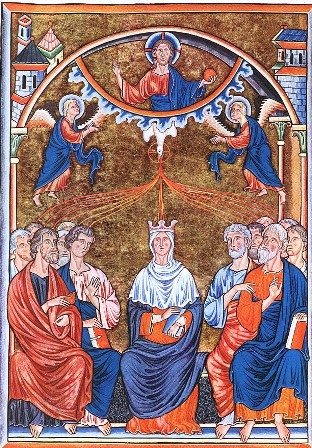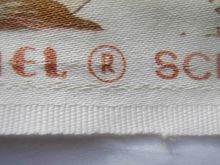 The Fiftieth Day Feast, Hebrew Shavuot or Greek Pentekosté, for the Jews commemorated the descent of God’s Law to Moses on Mount Sinai, wreathed in fire, fifty days after the Exodus. But Jewish feasts also looked forward even as they looked back to an historic event. At Shavuot they looked forward to the return of the fiery glory cloud of God’s presence in the Temple.
The Fiftieth Day Feast, Hebrew Shavuot or Greek Pentekosté, for the Jews commemorated the descent of God’s Law to Moses on Mount Sinai, wreathed in fire, fifty days after the Exodus. But Jewish feasts also looked forward even as they looked back to an historic event. At Shavuot they looked forward to the return of the fiery glory cloud of God’s presence in the Temple.
Fifty days after Our Lord’s Resurrection, the tenth (the number of perfection) from His Ascension, the Holy Spirit descended on the Apostles and first disciples to breathe grace-filled life into Christ’s Body, the Church.
The Spirit descended as “tongues of fire”, on the very day they memorialized the descent of God like fire on Mount Sinai.
The Jews at that time would also have thought of the vision of the temple in the Book of Enoch, made of tongues of fire.
Hence, this Pentecost event would have really got the the attention of the multitudes, perhaps a million people, thronging Jerusalem for the feast. Jewish Pentecost, Shevuot, was one of the three great pilgrimage festivals when men were obliged to go up the Jerusalem to offer their sacrifices.
This magnificent Sunday in the Roman Rite’s Vetus Ordo retains its Octave along with the special Communicantes and Hanc igitur.
In the Ordinary Form a lot was chopped out. However, the Collect is rooted in the ancient Gelasian Sacramentary.
Deus, qui sacramento festivitatis hodiernae universam Ecclesiam tuam in omni gente et natione sanctificas, in totam mundi latitudinem Spiritus Sancti dona defunde, et, quod inter ipsa evangelicae praedicationis exordia operata est divina dignatio, nunc quoque per credentium corda perfunde.
I like that defunde and perfunde. Spiffy.
Cor is “heart” and corda “hearts”. Sacramentum translates Greek mysterion. Sacramentum and Latin mysterium are often interchangeable in liturgical texts. Defundo means “to pour down, pour out”. Perfundo, is “to pour over, moisten, bedew”, and “to imbue, inspire” as well as “to dye”.
Exordium means “the beginning, the warp of a web”. Exordium invokes cloth weaving and selvage, the cloth’s edge, tightly woven so that the web will not fray, fall apart.
Exordium, also a technical term in ancient rhetoric, is the beginning of a prepared speech whereby the orator lays out what he is going to do and induces the listeners to attend.
From Pentecost onward Christ the Incarnate Word, although remote by His Ascension, is the present and perfect Orator delivering His saving message to the world through Holy Church. “He that heareth you, heareth me”, Christ told His Apostles with the Seventy (Luke 10:16).
Much hangs on exordia.
LITERAL VERSION:
O God, who by the sacramental mystery of today’s feast do sanctify Your universal Church in every people and nation, pour down upon the whole breadth of the earth the gifts of the Holy Spirit, and make that which divine favor wrought amidst the very beginnings of the preaching of the Good News to flow now also through believers’ hearts.
OBSOLETE ICEL (1973):
God our Father, let the Spirit you sent on your Church to begin the teaching of the gospel continue to work in the world through the hearts of all who believe.
Really? REALLY? Year in and year out the perpetrators and defenders of this dreck made the English-speaking Church stupider and weaker.
Moving on…
CURRENT ICEL (2011):
O God, who by the mystery of today’s great feast sanctify your whole Church in every people and nation, pour out, we pray, the gifts of the Holy Spirit across the face of the earth and, with the divine grace that was at work when the Gospel was first proclaimed, fill now once more the hearts of believers.
Unity and continuity are keys to this Collect.
The Holy Spirit pours spiritual life into the Body of Christ.
The Holy Spirit wove the early Church together through the preaching of the Apostles and their successors and, in the Church today, extends their preaching to our own time.
The Holy Spirit guarantees our unity and continuity across every border and century.
The Holy Spirit imbues and infuses, tints and dyes the fabric of the Church as He flows through it.
When the Holy Spirit’ fire poured over the Apostles, they poured out preaching in public speeches to people from every nation. I think they were not in the “upper room” but in the Temple, as the Law required Jewish men. In Greek, oikos can mean “temple” or “house of God”, not just “house”.
That makes greater sense of the immediate reaction they received.
 The Holy Spirit, in the preaching of the Apostles, began on Pentecost’s exordium to weave together the Church’s selvage, that strong stable edge of the fabric, through the centuries and down to our own day.
The Holy Spirit, in the preaching of the Apostles, began on Pentecost’s exordium to weave together the Church’s selvage, that strong stable edge of the fabric, through the centuries and down to our own day.
Also, for Shavuot, Pentecost, the Jews at harvest were commanded by God to leave the edges of the fields unharvested for the sake of the poor.
The bonds of man and God symbolically unraveled in the Tower of Babel event, when languages were divided (Gen 11:5-8).
Ever since the Pentecost exordium’s “reweaving”, though here and there and now and then there may be rips and tatters, Holy Church’s warp and weft hold true.
Let our hearts and prayers be raised for unity. Sursum corda!
In the Collect we pray that our corda may be imbued with the Gifts of the Holy Spirit. Sacrum septenarium!
Let them be closely woven into, knit into Holy Church and even over-sewn with her patterns, not ours.
Let our hearts be bounded about by her saving selvage, dyed in the Spirit’s boundless love.
Let us also pray for the unwitting agents of the Enemy of the soul, hanging onto Holy Church’s edge but in such a way that they tear at and fray the Church’s fabric.
Pardon my homographs, but though they be on the fringe, they endanger necessary threads, precious souls of our brothers and sisters who through their work of unraveling can be lost in the fray.
When we mesh with the Holy Church and remain true in the Faith and charity, our holy selvage and our salvation will not be undone.


































“Sacramentum translates Greek mysterion. Sacramentum and Latin mysterium are often interchangeable in liturgical texts.”
I often ponder whether or not some piece of etymological history of great weight lies behind this fact. The fact that the “pledge for an oath,” (some sort of material good deposited in a sacred place), was used to translate “mysterion” seems to me to indicate a process of thought worth investigating. Isidore of Seville:
“sacramentum est pignus sponsionis; vocatum autem sacramentum, quia violare, quod quisque promittit, perfidia est.”
Did the Latin mind, obsessed as we are with the law, see in the mysteries of faith a pledge and promise, a sacred deposit, of an unfailing and ever-faithful God?